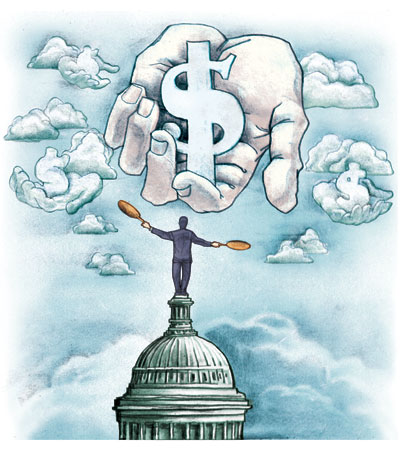Husky wrote:This has always perplexed me about communists; their scorn for division of labor is an absurdity, economically speaking.
I know. Historically it always works out if one area specializes in something completely. Say, Oregon becomes specialized in producing wood for pencils and other materials. Then when, say, a housing boom ends and people aren't building houses of furniture to put into houses, and paper and pencils are at a historic low amount of production, Oregon is fine. Because the division of labor is part of everything else.
Oh wait, it's a disaster for everyone as the dominos start falling and all specialized areas collapse due to such divisions.
Environmentally, it's always been good for everyone too and hasn't done a thing to force division based on what it does to everyone else:
Engels wrote:The further consequences, which appear only later and become effective through gradual repetition and accumulation, were totally neglected. The original common ownership of land corresponded, on the one hand, to a level of development of human beings in which their horizon was restricted in general to what lay immediately available, and presupposed, on the other hand, a certain superfluity of land that would allow some latitude for correcting the possible bad results of this primeval type of economy. When this surplus land was exhausted, common ownership also declined. All higher forms of production, however, led to the division of the population into different classes and thereby to the antagonism of ruling and oppressed classes. Thus the interests of the ruling class became the driving factor of production, since production was no longer restricted to providing the barest means of subsistence for the oppressed people. This has been put into effect most completely in the capitalist mode of production prevailing today in Western Europe. The individual capitalists, who dominate production and exchange, are able to concern themselves only with the most immediate useful effect of their actions. Indeed, even this useful effect – inasmuch as it is a question of the usefulness of the article that is produced or exchanged – retreats far into the background, and the sole incentive becomes the profit to be made on selling.
Classical political economy, the social science of the bourgeoisie, in the main examines only social effects of human actions in the fields of production and exchange that are actually intended. This fully corresponds to the social organisation of which it is the theoretical expression. As individual capitalists are engaged in production and exchange for the sake of the immediate profit, only the nearest, most immediate results must first be taken into account. As long as the individual manufacturer or merchant sells a manufactured or purchased commodity with the usual coveted profit, he is satisfied and does not concern himself with what afterwards becomes of the commodity and its purchasers. The same thing applies to the natural effects of the same actions. What cared the Spanish planters in Cuba, who burned down forests on the slopes of the mountains and obtained from the ashes sufficient fertiliser for one generation of very highly profitable coffee trees – what cared they that the heavy tropical rainfall afterwards washed away the unprotected upper stratum of the soil, leaving behind only bare rock! In relation to nature, as to society, the present mode of production is predominantly concerned only about the immediate, the most tangible result; and then surprise is expressed that the more remote effects of actions directed to this end turn out to be quite different, are mostly quite the opposite in character; that the harmony of supply and demand is transformed into the very reverse opposite, as shown by the course of each ten years’ industrial cycle – even Germany has had a little preliminary experience of it in the “crash”; that private ownership based on one’s own labour must of necessity develop into the expropriation of the workers, while all wealth becomes more and more concentrated in the hands of non-workers
That's not even getting into the other half of it, with alienation.
Nor is it to say that it's all bad. The Communist Manifesto, and other writings, celebrate the progressive achievements that the division of labor has achieved in creating a single planet where everyone is connected.
We Marxists just aren't religious fanatics though. For the capitalist, it has to all be good or bad, or you're going to insult the Invisible Hand.
The Invisible Hand is always right. We must always adjust our attitudes to be fanatical about it and try to get the Invisible Hand to like us.

Those pesky communists keep talking about, "facts," and look at the material world and explain things without condemning anything as morally good or bad—instead of just screaming a shrill devotion to an abstraction.

Alis Volat Propriis; Tiocfaidh ár lá; Proletarier Aller Länder, Vereinigt Euch!



















 - By late
- By late